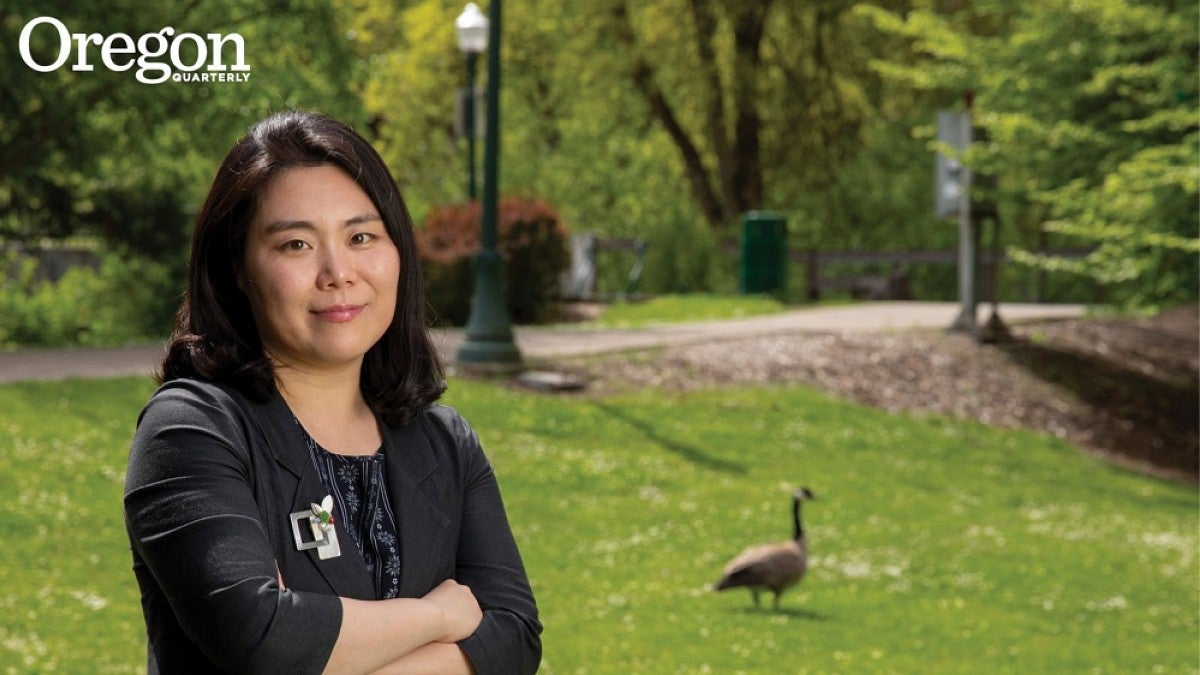CONFLICT OF GREENS
Solar power makes perfect sense for cities committed to renewable energy, right? But what if the plan is to build the power plant on wetlands for endangered species?
Yekang Ko calls this a “conflict of greens.” As cities cut their use of fossil fuels, Ko expects these clean-energy conundrums to double or even triple. She looks for solutions, working with fellow scholars, businesses, governments, communities—and her students.
Ko heads an arm of the Association of Pacific Rim Universities (APRU) that helps cities better coexist with the natural landscapes around them.
In coastal Taiwan, for example, there are plans to build solar-powered “farms” on wetlands that are home to an endangered water bird called the black-faced spoonbill. In a project funded by the National Geographic Society, Ko and her collaborators found better spots for the farms, including substandard agricultural land owned by Tai Sugar corporation, which aims to become a “green”-friendly business.
For their final projects in Ko’s sustainable energy landscapes course, students last spring helped design the proposal for a Tai Sugar solar project that would be resource-efficient and environmentally friendly. The company is reviewing it, and Ko hopes the example will resonate with cities across the Pacific Rim.
“Landscape architects critically engage with our communities and landscapes—from the site to the regional scale—to address the complex challenges of our common future,” Ko says. “Resolving a ‘conflict of greens’ is one of them.”
A SPECIAL AGENT FOR THE EARTH
Growing up in Seoul, South Korea—one of the world’s densest cities—Ko lived in a “gray environment” of buildings, buildings, buildings. That whetted her appetite for the pastoral landscapes she saw on TV, and it contributed to her decision to study environmental science at Korea University. There, Ko and her friends founded an earth-friendly club that traversed the country to examine touchpoints for the clash of development and the natural world. They named the group Eco-files, after the 1990s cult sci-fi TV series The X Files.
FROM SEOUL TO BERKELEY AND BEYOND
Travel is one of Ko’s passions—she’s been to 25 countries for work or recreation. As director of the APRU’s Sustainable Cities and Landscapes Hub, Ko oversees a program with 11 member universities across the Pacific Rim, from New Zealand to Chile. Ko found Seoul dynamic but dense, while Eugene and Berkeley—where she earned her doctorate at the University of California—seem an idyllic mix of neighborhoods and natural areas. “Recently I visited Crater Lake with my family and friends,” Ko says. “One day in the near future, I hope to visit Heaven Lake, a crater lake in North Korea, as well.”
TALK TO THE ANIMALS
Ko once entertained plans of becoming a veterinarian but decided she couldn’t cut it, so to speak. “I’ve always loved animals,” Ko says, smiling. “But loving animals and performing surgery on them—those are very different things.” She can envision a not-too-distant future when her own landscape will feature a couple of dwarf goats, known for their friendly disposition. “Goats are amazing,” Ko says, “and in Eugene that could be possible.”
—By Matt Cooper, University Communications


